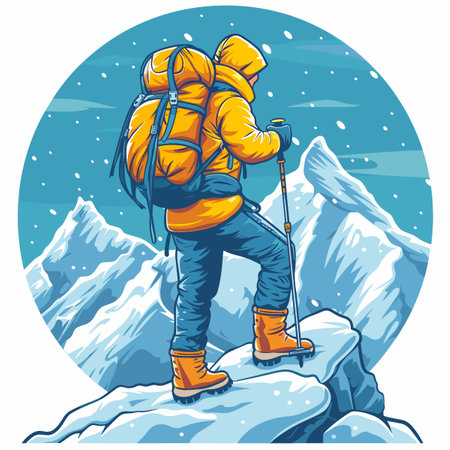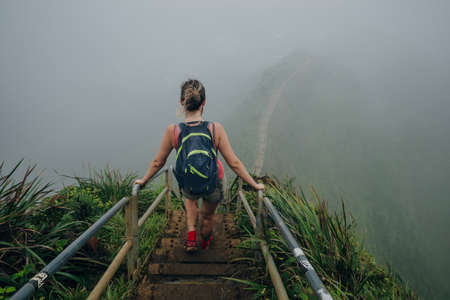1. Choosing the Right Daypack
When preparing for a family day-hike, picking the right backpack is key to making your adventure comfortable and fun for everyone. The perfect daypack should fit well, have enough space for your essentials, and be easy for each family member to carry—even the kids! Here’s how you can choose the best pack for every age group in your family.
Capacity: How Much Space Do You Need?
The size of your daypack depends on how much you need to bring and who will be carrying it. For most family day-hikes, you won’t need a huge pack. Check out the table below for a quick guide:
| Age Group | Recommended Capacity | Notes |
|---|---|---|
| Young Kids (4-8 yrs) | 10-15 liters | Lightweight, just snacks & water |
| Older Kids (9-12 yrs) | 15-20 liters | Add a light jacket or extra layer |
| Teens & Adults | 20-30 liters | Room for first-aid, lunch, extra gear |
Fit: Comfort Matters!
No one wants a sore back or shoulders before lunch! Look for padded shoulder straps and an adjustable chest strap. A waist belt helps distribute weight evenly—great for longer hikes or heavier loads. Packs with mesh back panels also help keep you cool on hot days.
Tips for Getting the Best Fit:
- Try it on in-store with some weight inside.
- The bottom of the pack should sit at your hip bones.
- Shoulder straps should hug your shoulders without pinching.
- If buying for kids, make sure they can easily take it on and off by themselves.
Popular American Brands to Consider
You’ll find plenty of great options at outdoor retailers across the U.S. Here are some trusted brands known for quality and comfort:
- Osprey: Durable, comfortable, lots of sizes (including youth models).
- The North Face: Stylish and rugged; great all-around packs for families.
- Deuter: Especially good kid-friendly options with ergonomic design.
- REI Co-op: Affordable and reliable, plus expert advice at REI stores nationwide.
- Kelty: Known for lightweight and budget-friendly packs suitable for casual hikes.
A Quick Checklist Before You Buy:
- Is it big enough for what you need?
- Does it fit comfortably when loaded?
- Are there easy-access pockets for snacks, water, or sunscreen?
- If hiking with small children, is there room to stash their treasures too?
2. Essentials for Kids, Teens, and Adults
Packing for a family day-hike in the U.S. means planning for everyone’s needs and comfort. Here’s an age-by-age breakdown of what to bring for kids, teens, and adults—covering gear, snacks, and safety items that match American hiking traditions.
Kids (Ages 3-12)
| Item | Why It’s Important |
|---|---|
| Child-sized backpack | Lightweight, fits small frames; makes them feel involved |
| Water bottle with straw/spout | Easy hydration, spill-proof |
| Nut-free granola bars & fruit snacks | Quick energy, allergy-friendly for group hikes |
| Sunscreen stick & hat | Sun protection for sensitive skin |
| Comfort item (toy or plush) | Soothes nervous or tired hikers |
| Whistle on lanyard | Safety tool in case they wander off trail |
| Poncho or rain jacket | Weather changes quickly outdoors in many U.S. regions |
| Bug spray wipes (DEET-free) | Keeps mosquitoes and ticks away safely |
| Band-aids & mini first-aid kit | Cuts and scrapes happen often with little ones on trail |
| Extra socks/shirt in zip-top bag | Mud puddles are irresistible! |
Teens (Ages 13-18)
| Item | Why It’s Important |
|---|---|
| Larger daypack (15-20L) | Carries their own water, layers, and personal items independently |
| Reusable water bottle or hydration pack | Easier to drink while walking; encourages proper hydration habits |
| High-protein snacks (jerky, trail mix, protein bars) | Satisfies growing appetites on the go |
| Sunglasses & baseball cap/visor | American teens love stylish sun protection |
| Sunscreen lotion (travel-size) | Prevents burns during long hikes |
| Personal phone with emergency contact card | Navigation apps and safety connections if separated from group |
| Pocket-sized hand sanitizer | Keeps hands clean before eating snacks |
| Trekking poles (optional) | Adds stability on rocky or steep trails common in U.S. parks |
| Pocket knife/multi-tool (if allowed by parents) | A classic American “rite of passage” for responsible teens |
Adults (Ages 19+)
| Item | Why It’s Important |
|---|---|
| Larger backpack with hip belt (20-30L) | Carries extra layers, first-aid kit, and family essentials comfortably |
| Main first-aid kit & medications | Takes care of blisters, stings, allergies, and minor injuries for the group |
| Sufficient water for group + filter/purifier | Covers unexpected delays or emergencies—U.S. hikers value preparedness |
| Sliced fruit, cheese sticks, nut butters, sandwiches | Nourishing lunch options that don’t need refrigeration |
| Sunscreen & bug spray for reapplication | The American sun can be intense even on cloudy days; bugs are everywhere! |
| Ponchos/rain jackets for all family members | Packed weather protection is a must in unpredictable climates like the Rockies or Appalachians |
| Pocket map/compass or GPS device | Doubles as a teaching tool for kids about navigation—many U.S. families practice this skill together |
| Ziploc bags/trash bags (“Leave No Trace” supplies) | Packs out all trash and teaches kids respect for nature—a core American outdoor ethic |
Pro Tip:
If you’re hiking with babies or toddlers, add a child carrier backpack, pacifiers clipped to straps, baby wipes, extra diapers/pull-ups, and small board books or finger foods.
Quick Packing Checklist by Age Group:
| Kids (3-12) | Teens (13-18) | Adults (19+) |
|---|---|---|
| – Child backpack – Water bottle – Snacks – Hat – Whistle – Poncho – Bug wipes – Band-aids – Extra socks/shirt |
– Daypack – Hydration pack – Protein snacks – Sunglasses/cap – Phone/contact card – Hand sanitizer – Trekking poles |
– Large backpack – Main first-aid kit – Family snacks/lunches – Water filter – Map/compass/GPS – Trash bags |
This approach ensures everyone has what they need for a safe and fun hike—just like families across America enjoy their time outdoors together!

3. Weather-Appropriate Clothing and Layers
When packing for a family day-hike in the U.S., unpredictable weather is almost a guarantee, whether youre hiking in the Rockies, the Pacific Northwest, or along the Appalachian Trail. Layering is your best friend! The key is to wear and pack clothes that you can add or remove as temperatures change throughout the day.
Why Layering Matters
Layering helps you adapt to chilly mornings, warm afternoons, sudden rain showers, or cool winds at higher elevations. This strategy keeps everyone comfortable and safe from both cold and overheating—especially important for young kids and older adults.
Essential Clothing Layers for Every Family Member
| Layer | Description & Examples | Why It’s Important |
|---|---|---|
| Base Layer | Moisture-wicking shirts (synthetic or merino wool), long underwear for colder climates. | Keeps sweat off skin, preventing chills. |
| Mid Layer | Lightweight fleece jacket, down vest, sweatshirt. | Adds warmth; easy to put on or take off as needed. |
| Outer Layer | Waterproof or windproof jacket, rain poncho. | Protects against rain, wind, and sudden temperature drops. |
| Pants/Shorts | Quick-drying hiking pants (convertible to shorts are great!), leggings for kids. | Comfortable for walking; dries quickly if wet. |
| Accessories | Hat (for sun or warmth), gloves (for cold), sunglasses, buff or neck gaiter. | Adds extra protection from sun, cold, and bugs. |
Packing Tips by Age Group
- Toddlers & Kids: Always bring an extra set of clothes (kids love puddles and mud!). Opt for bright colors so they’re easy to spot on the trail.
- Teens: Encourage them to dress in layers too—teens may resist but will thank you later when temps change!
- Adults: Lightweight, packable jackets are a must. Consider a wide-brimmed hat for sun protection.
- Seniors: Bring an extra mid-layer and consider hand warmers for added comfort if it gets chilly.
Don’t Forget Footwear!
Avoid cotton socks; go for wool or synthetic blends that prevent blisters. Well-fitting hiking boots or trail shoes are essential for everyone—ankle support matters on uneven terrain. Throw in a pair of sandals or crocs for creek crossings or after-hike comfort if space allows.
Packing Pro Tip
Toss in a lightweight emergency blanket or poncho for every hiker—these take up almost no space but can be a real lifesaver in unexpected weather changes!
4. Safety and First Aid for Families
Basic First Aid Supplies to Pack
When hiking with your family, especially with kids, its important to be prepared for minor injuries and unexpected situations. Here’s a simple table to help you pack a basic first aid kit suitable for all ages:
| Item | Why It’s Important |
|---|---|
| Adhesive Bandages (various sizes) | For small cuts, scrapes, or blisters |
| Antiseptic Wipes/Ointment | To clean wounds and prevent infection |
| Tweezers | For removing splinters or ticks |
| Sterile Gauze Pads & Tape | For larger wounds or bleeding control |
| Child-Appropriate Pain Reliever (Tylenol/Ibuprofen) | To manage pain or fever, safe for kids and adults |
| Sunscreen & Lip Balm with SPF | Protects skin from sunburn, essential for all ages |
| Insect Repellent (family-safe) | Keeps bugs away; choose one safe for young children if needed |
| Moleskin or Blister Pads | Prevents and treats blisters during hikes |
| Emergency Whistle | Helps kids signal if separated from the group |
| Small Emergency Blanket | For warmth in case of sudden weather changes |
| Allergy Medication (if needed) | If anyone in your family has allergies, don’t forget this! |
| List of Emergency Contacts & Medical Info Card | Carries important information in case of emergency, including allergies and medications for each family member |
Emergency Contacts and Information Tips
- Save local emergency numbers: In the US, always call 911 for emergencies.
- Parks and ranger stations: Before you hike, write down the phone number of the nearest ranger station or park office.
- ID tags: For younger kids, attach an ID tag to their backpack with parent/guardian contact info.
Standard American Outdoor Safety Practices for Families Hiking with Children
The Buddy System:
This is a classic safety tip in America—everyone should have a buddy. Teach your kids never to wander off alone and always stay within sight of an adult.
“Stay Put” Rule:
If someone gets separated from the group, teach them to stay where they are and blow their emergency whistle three times (the universal signal for help).
Dressing Smart:
Dress in layers and choose bright colors so everyone is easy to spot. Always pack extra clothing in case the weather changes suddenly.
Telling Someone Your Plans:
Let a friend or relative know your hiking plans, including your starting point, trail name, who is with you, and when you expect to return.
Quick Tip!
If you’re hiking in bear country or other wildlife areas common in the US, carry bear spray if recommended by rangers, keep food sealed tightly, and make plenty of noise on the trail to avoid surprising animals.
Packing these essentials and following standard safety practices helps ensure a safer and more enjoyable day-hike for every member of your family!
5. Fun Extras and Comfort Items
While you’ve got the basics covered, adding a few fun extras can make your family day-hike even more memorable! These non-essential but awesome items bring comfort, entertainment, and a little learning to everyone in the group. Here are some ideas to consider for hikers of all ages:
Trail Games and Activities
Keep kids (and grown-ups) engaged on the trail with simple games or activities. Try these crowd-pleasers:
- Scavenger Hunt: Make a list of things to spot, like a red leaf or animal tracks.
- I Spy: A classic game that works anywhere, especially in nature.
- Nature Bingo: Create cards with common trail sights for kids to mark off.
Guidebooks and Field Guides
Bring along lightweight field guides to identify plants, birds, or insects. These encourage curiosity and make learning about the outdoors hands-on and fun. For tech-lovers, try a plant or bird identification app on your phone!
Tech Gadgets for Outdoor Adventures
| Item | Description | Why Bring It? |
|---|---|---|
| Pocket Binoculars | Compact size, easy for kids and adults | Great for spotting wildlife or distant views |
| Portable Power Bank | Keeps devices charged | Handy for photos, GPS, or safety apps |
| Pocket Camera/Action Cam | Durable & lightweight | Capture fun moments along the way |
| GPS Watch/Fitness Tracker | Tracks distance and elevation | Makes hiking stats fun for older kids/teens |
Comfort Items for All Ages
- Sit Pads or Lightweight Blanket: Perfect for snack breaks or picnics.
- Sunscreen & Bug Spray Wipes: Easy to reapply without mess.
- Packed Treats: Surprise snacks can be a great motivator—think trail mix with chocolate chips or fruit gummies.
- Mini First Aid Kit: For peace of mind when hiking with little ones.
- Bubbles or Glow Sticks: Add some magic to rest stops, especially if you’re hiking late in the day!
Treat Yourself!
A family day-hike is as much about enjoying time together as it is about reaching the end of the trail. Throwing in a few fun extras keeps spirits high and makes memories that last well beyond your hike.


